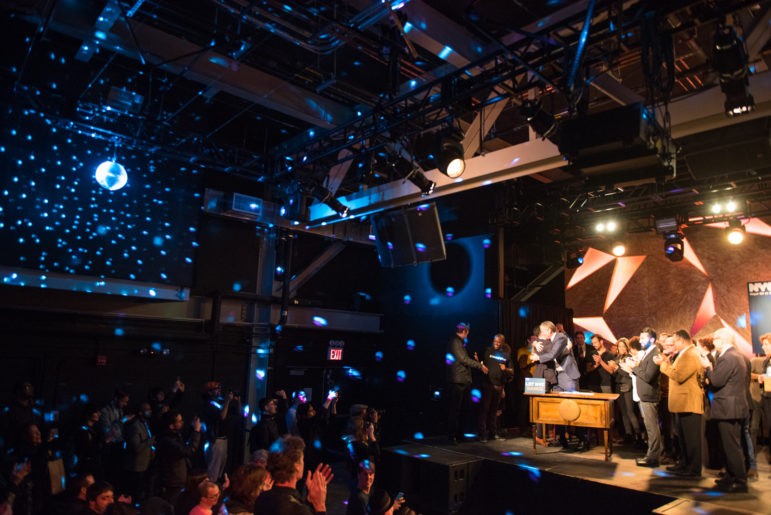
Edwin J. Torres/Mayoral Photography Office.
Mayor de Blasio signs the bill repealing the Cabaret Law.
The sound of pumping music poured into the street as doors opened and closed. Crowds of eager partygoers stood in spiraling lines, shivering. Bouncers scanned IDs and clicked handheld counters to keep track of crowd numbers.
It was a Friday evening in November, and 12 of Hell’s Kitchen’s documented nightclubs were open for dancing. Only six of the establishments had cabaret licenses, according to the Department of Citywide Administrative Services.
These unlicensed dance venues no longer have to worry about fines for operating without a license. The recent repeal of New York’s 91- year old Cabaret Law means bars and restaurants do not need a license to permit social dancing.
Yet nightlife experts say the repeal of the Cabaret Law won’t affect the city that never sleeps.
“It won’t impact nightlife at all,” says Glenn Raymond, a hospitality entrepreneur for 26 years and the owner of Mekka NYC, a dance club set to open at 618 W. 46th St. in 2018. “If you aren’t zoned for cabaret before, you can’t just start having dance parties,” he said.
Attorney Michael J. Paleudis agrees.
“The repeal may not have all that much teeth,” says Paleudis, whose practice focuses on alcoholic beverage law, contract matters and real estate law. “Zoning requirements are still going to be implicated. There are still primarily going to be community board issues,” he said.
Paleudis and Raymond also argue that the repeal doesn’t make it easier for establishments located in districts that permit dancing to open, even though a cabaret license is no longer needed.
“Those places that are zoned, will still have to get fully up to code before they open,” says Raymond.
Before a restaurant or entertainment business opens, it must hold a current Department of Health and Mental Hygiene food service establishment permit, premise approval by the fire department, an electrical inspection and other applicable business certificates.
Licensees who have already obtained liquor licenses from the New York State Liquor Authority have likely indicated in their applications they would not allow dancing, says Paleudis. To change their licenses, businesses would have to file for a change in operations, submit a new application with the state authority and give notice to the community boards.
“In real terms, the repeal alone is not going to increase the number of spaces that are able to offer dancing,” he says. “If it does, it will only increase marginally.”
The New York City Cabaret Law was instituted in 1926 during the Prohibition Era and was known to target interracial dancing at black jazz clubs during the Harlem Renaissance.
Councilman Rafael Espinal, who represents the Brooklyn communities of Bushwick, Brownsville, Cypress Hills and East New York, which have many illegal dance venues, introduced the bill.
Espinal’s legislation removes the costly and time-consuming cabaret application process that required businesses to meet more than 10 stipulations. The councilman’s bill, signed into law by Mayor Bill de Blasio this fall, calls for establishments to continue to install and maintain security cameras, to ensure security guards are licensed pursuant to state law and to maintain a roster of such security guards, but eliminates requirements that businesses provide proof of electrical inspections, proof of fire inspection and an employee background check affirmation—requirements that the businesses would have to have already fulfilled when they first opened.
While Raymond supports the repeal, he says the old requirements provided security.
“As an operator, it’s about safety, not ease. The safety of the people matters most,” he says. “I didn’t take any steps of the application as a hassle; I take it as a learning experience to properly run a venue.”








